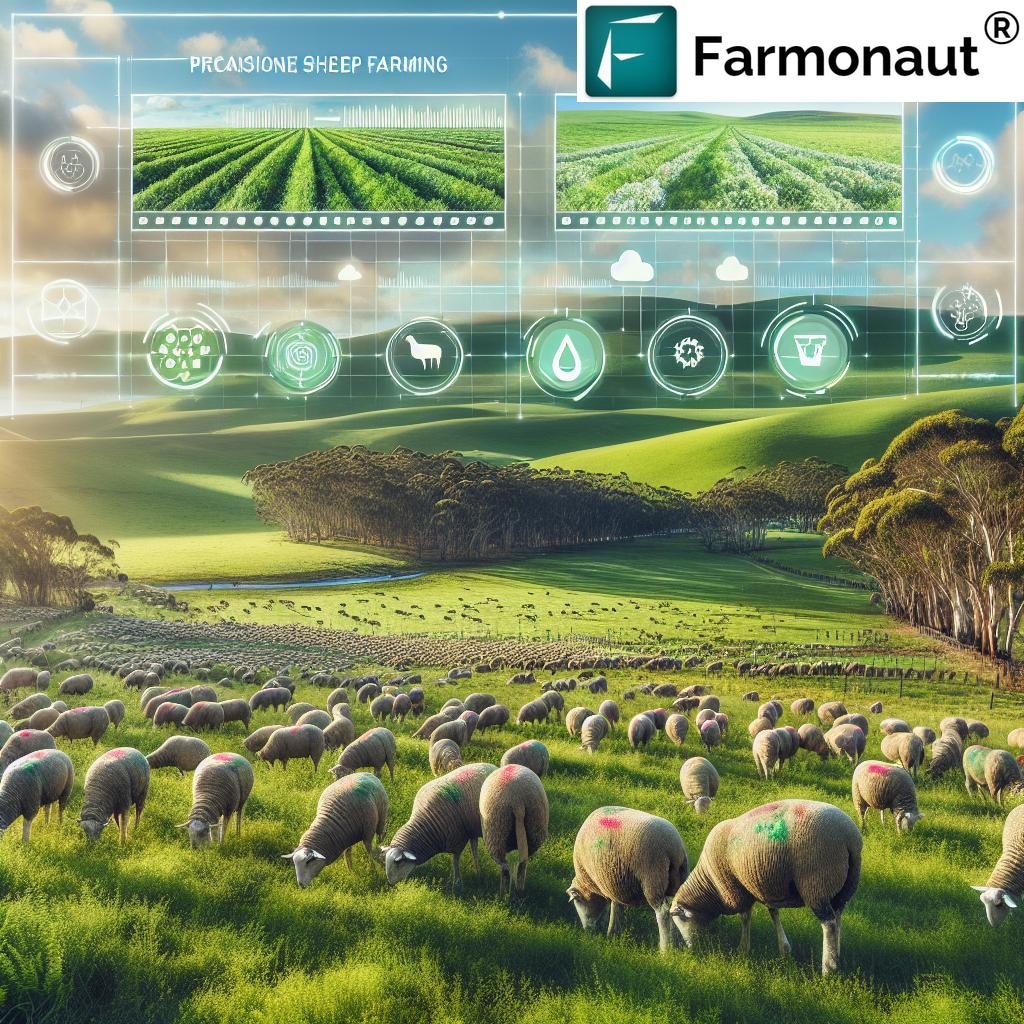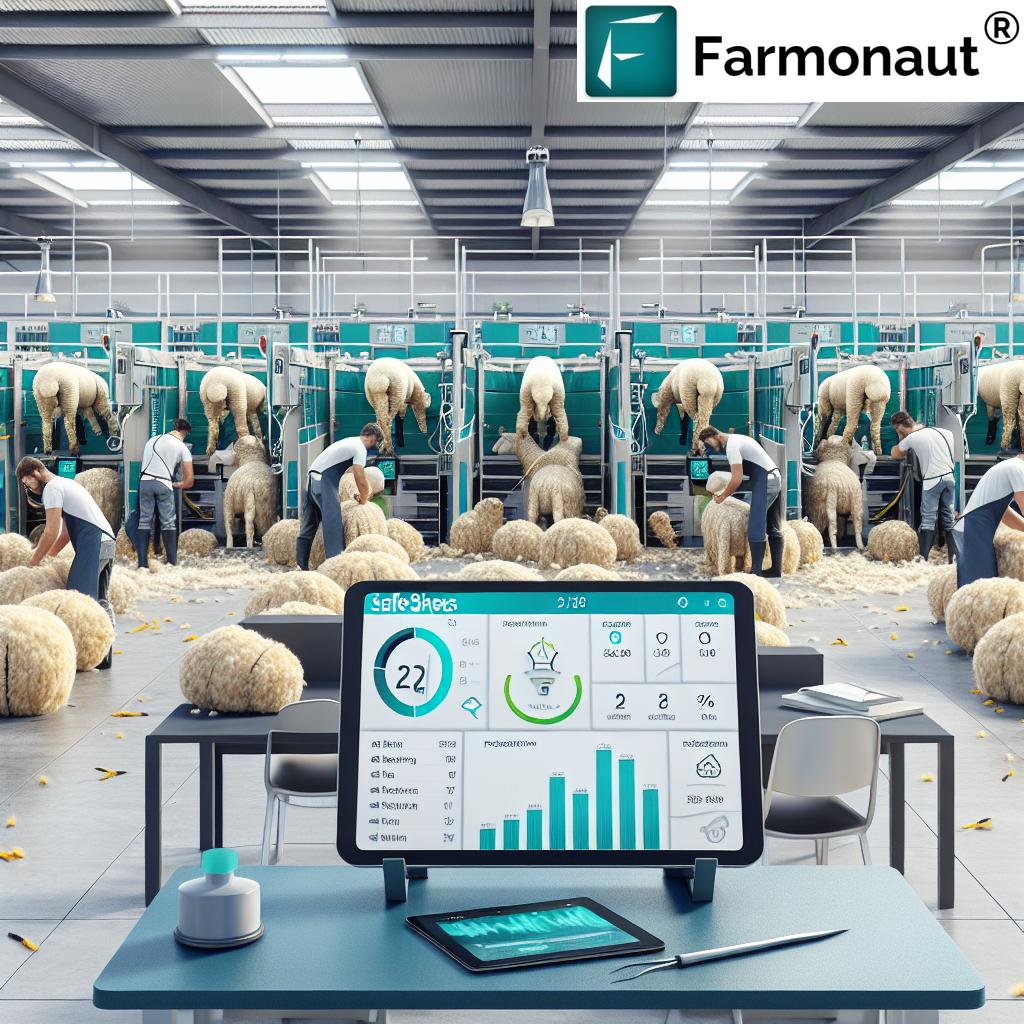Revolutionizing South Australian Sheep Farming: Sustainable Precision Management for Healthier Flocks and Thriving Pastures
“South Australian sheep farmers can reduce water usage by up to 30% using drought-resistant farming techniques and smart water conservation methods.”
Welcome to our comprehensive guide on revolutionizing sheep farming in South Australia through sustainable precision management practices. At Farmonaut, we’re committed to empowering farmers with cutting-edge technology and data-driven insights to enhance flock health, optimize pasture management, and promote environmental stewardship. In this blog post, we’ll explore innovative strategies for sheep health management, sustainable grazing practices, and the integration of smart farming systems to create thriving, resilient agricultural operations.

Precision Livestock Management: The Future of Sheep Farming
Precision livestock management is revolutionizing the way we approach sheep farming in South Australia. By leveraging advanced technologies and data analytics, we can make informed decisions that lead to healthier flocks, improved productivity, and more sustainable farming practices. Let’s delve into the key aspects of precision livestock management and how they’re transforming the industry:
- Satellite-based monitoring: Utilizing high-resolution satellite imagery to assess pasture health and optimize grazing patterns
- IoT sensors: Implementing Internet of Things (IoT) devices to track flock movements, monitor individual animal health, and detect early signs of illness
- Data-driven decision making: Analyzing comprehensive datasets to make informed choices about breeding, nutrition, and resource allocation
- Automated systems: Integrating smart feeders, water management systems, and climate control technologies to enhance efficiency and animal welfare
At Farmonaut, we’re proud to offer cutting-edge solutions that support precision livestock management. Our satellite-based crop health monitoring system can be adapted for pasture management, providing valuable insights into vegetation health through NDVI (Normalized Difference Vegetation Index) analysis. This technology enables farmers to make data-driven decisions about grazing rotations and pasture improvement strategies.
Explore our advanced farm management solutions:
Sheep Health Management: Proactive Approaches for Thriving Flocks
Maintaining optimal flock health is crucial for successful sheep farming. By implementing proactive health management strategies, we can prevent diseases, improve productivity, and ensure the overall well-being of our animals. Here are some key areas to focus on:
Parasite Control: Tackling Worms, Flies, and Lice
Parasites pose a significant threat to sheep health and productivity. Implementing an integrated pest management approach can help control these common issues:
- Worm management: Regular fecal egg count monitoring, strategic deworming, and pasture rotation to break parasite lifecycles
- Fly strike prevention: Timely shearing, crutching, and the use of fly repellents to reduce the risk of flystrike
- Lice control: Implementing quarantine procedures for new animals, regular inspections, and appropriate treatment when necessary
Vaccination Strategies for Disease Prevention
A robust vaccination program is essential for protecting your flock against common diseases. Consider the following vaccination strategies:
- Develop a customized vaccination schedule based on regional disease risks and flock history
- Ensure proper storage and administration of vaccines to maximize efficacy
- Keep detailed records of vaccinations for each animal to maintain an effective health management system
“Effective vaccination strategies and pest control can increase lamb survival rates by up to 15% in South Australian sheep farms.”
Foot Health and Lameness Prevention
Maintaining good foot health is crucial for sheep mobility and overall well-being. Implement these practices to prevent lameness and foot-related issues:
- Regular hoof trimming and inspection
- Foot bathing in zinc sulfate or copper sulfate solutions
- Providing dry, clean bedding areas to reduce moisture-related foot problems
- Culling chronically affected animals to improve overall flock health
By focusing on these key areas of sheep health management, we can significantly improve the overall well-being and productivity of our flocks. Farmonaut’s AI-powered advisory system, Jeevn AI, can provide valuable insights and recommendations for optimizing your sheep health management strategies.
Sustainable Grazing Practices: Nurturing Pastures and Protecting the Environment
Sustainable grazing practices are essential for maintaining healthy pastures, promoting biodiversity, and ensuring the long-term viability of sheep farming operations. Let’s explore some key strategies for implementing sustainable grazing in South Australia:
Rotational Grazing Systems
Rotational grazing involves dividing pastures into smaller paddocks and moving sheep between them at regular intervals. This approach offers several benefits:
- Improved pasture recovery and regrowth
- More even grazing patterns, reducing overgrazing and soil erosion
- Better parasite management by breaking lifecycle patterns
- Enhanced nutrient distribution across pastures
Farmonaut’s satellite-based monitoring can help farmers track pasture health and make informed decisions about grazing rotations, ensuring optimal use of available resources.
Drought-Resistant Farming Techniques
In the face of changing climate patterns, implementing drought-resistant farming techniques is crucial for maintaining productivity during dry periods:
- Drought-tolerant pasture species: Planting native grasses and legumes that can withstand periods of low rainfall
- Soil health improvement: Enhancing organic matter content and soil structure to improve water retention
- Strategic destocking: Developing plans for reducing flock sizes during prolonged drought periods
- Alternative feed sources: Exploring options like fodder shrubs or drought-resistant crops to supplement grazing during dry spells
Water Conservation in Agriculture
Efficient water management is critical for sustainable sheep farming, especially in South Australia’s often arid climate. Consider these water conservation strategies:
- Rainwater harvesting: Installing systems to capture and store rainwater for use during dry periods
- Efficient irrigation systems: Implementing low-pressure sprinklers or drip irrigation for pasture improvement projects
- Water-efficient troughs: Using automatic shut-off valves and leak detection systems to prevent water waste
- Catchment management: Maintaining and improving natural water catchments on your property
Farmonaut’s platform can assist in monitoring soil moisture levels and providing insights for optimal water management, helping farmers make informed decisions about irrigation and water conservation.

Livestock Technology Solutions: Enhancing Productivity and Animal Welfare
Integrating advanced technology into sheep farming operations can significantly improve productivity, animal welfare, and overall farm efficiency. Let’s explore some innovative livestock technology solutions:
Electronic Identification (EID) Systems
EID systems using RFID tags provide a range of benefits for sheep management:
- Accurate individual animal tracking and record-keeping
- Automated data collection for weight gain, health status, and breeding information
- Improved traceability for food safety and quality assurance programs
- Streamlined handling and sorting processes
Smart Feeding Systems
Automated feeding systems can optimize nutrition and reduce labor costs:
- Precision feeding based on individual animal needs and production stages
- Automatic monitoring of feed intake and adjustment of rations
- Reduced feed waste and improved feed conversion efficiency
Remote Monitoring and Surveillance
Implementing remote monitoring technology can enhance flock management and security:
- GPS tracking collars for monitoring flock movements and grazing patterns
- Drone technology for pasture assessment and flock surveillance
- Smart cameras and sensors for early detection of predators or security threats
Farmonaut’s platform integrates seamlessly with various livestock technology solutions, providing a centralized hub for data analysis and decision-making. Our API allows for easy integration with existing farm management systems, enhancing the overall effectiveness of your technology investments.
Explore our API solutions:
Farmonaut API
API Developer Docs
Pasture Management Techniques: Maximizing Forage Quality and Quantity
Effective pasture management is crucial for maintaining healthy sheep and ensuring sustainable production. Here are some key techniques to optimize your pastures:
Soil Health and Fertility Management
- Regular soil testing to monitor nutrient levels and pH
- Strategic application of fertilizers based on soil test results and pasture needs
- Encouraging beneficial soil microorganisms through minimal tillage and organic matter addition
Pasture Species Selection and Diversification
- Choosing a mix of grass and legume species suited to local climate and soil conditions
- Incorporating drought-tolerant species to improve resilience
- Implementing pasture renovation techniques to maintain desirable species composition
Grazing Management Strategies
- Implementing rotational or cell grazing systems to optimize pasture utilization
- Monitoring pasture growth rates and adjusting stocking rates accordingly
- Using temporary electric fencing for flexible paddock management
Farmonaut’s satellite-based monitoring can provide valuable insights into pasture health and growth rates, enabling more precise management decisions. Our NDVI analysis can help identify areas of your pasture that may require attention or improvement.
Agricultural Pest Control: Protecting Your Flock and Pastures
Effective pest control is essential for maintaining healthy sheep and productive pastures. Let’s explore strategies for managing common agricultural pests in South Australian sheep farming:
Vertebrate Pest Management
Rabbits:
- Implement integrated control methods, including warren ripping, baiting, and biological control (e.g., rabbit calicivirus)
- Maintain rabbit-proof fencing around vulnerable areas
- Encourage natural predators like birds of prey
Foxes and Wild Dogs:
- Use a combination of exclusion fencing, trapping, and strategic baiting programs
- Implement guardian animals like Maremma sheepdogs or alpacas
- Collaborate with neighboring properties for coordinated control efforts
Invertebrate Pest Management
Flies:
- Practice good sanitation to reduce breeding sites
- Use targeted insecticides and fly traps
- Implement strategic sheep crutching and shearing to minimize flystrike risk
Internal Parasites:
- Develop an integrated worm management plan, including regular fecal egg count monitoring
- Implement grazing management strategies to reduce parasite exposure
- Use selective breeding for parasite resistance
Farmonaut’s AI-powered advisory system can help farmers develop targeted pest control strategies based on local conditions and historical data, ensuring more effective and sustainable pest management practices.
Smart Farming Systems: Integrating Technology for Optimal Results
Smart farming systems are revolutionizing the way we approach sheep farming, offering unprecedented levels of control, efficiency, and insight. Here’s how we can leverage these technologies for better outcomes:
Data-Driven Decision Making
- Implement farm management software to centralize data collection and analysis
- Use predictive analytics to forecast production trends and potential issues
- Leverage machine learning algorithms for optimizing breeding programs and flock management
Automated Monitoring and Control Systems
- Install smart sensors for real-time monitoring of environmental conditions
- Implement automated climate control systems in shearing sheds and lambing areas
- Use smart gates and weighing systems for efficient flock sorting and management
Precision Agriculture Techniques
- Utilize GPS-guided machinery for precise pasture improvement and maintenance
- Implement variable-rate technology for targeted fertilizer and pesticide application
- Use drone technology for pasture mapping and flock monitoring
Farmonaut’s comprehensive platform integrates seamlessly with various smart farming systems, providing a centralized hub for data analysis and decision-making. Our satellite-based monitoring and AI-powered insights can enhance the effectiveness of your smart farming initiatives, leading to more sustainable and profitable operations.
Explore our mobile apps for on-the-go farm management:
Sheep Breeding Strategies: Improving Genetics for Better Performance
Effective breeding strategies are crucial for improving flock productivity, health, and overall performance. Let’s explore some key approaches to enhance your sheep breeding program:
Genetic Selection and Improvement
- Utilize Australian Sheep Breeding Values (ASBVs) to select for desirable traits
- Implement genomic testing for more accurate breeding decisions
- Focus on traits such as growth rate, wool quality, parasite resistance, and mothering ability
- Consider crossbreeding programs to introduce beneficial traits from other breeds
Reproductive Management
- Implement synchronized breeding programs for more efficient lambing periods
- Use artificial insemination or embryo transfer to introduce superior genetics
- Monitor ewe body condition and nutrition to optimize fertility and lamb survival
- Implement rigorous ram health and fertility testing programs
Lamb Rearing and Management
- Provide appropriate nutrition and shelter for pregnant ewes and newborn lambs
- Implement early weaning strategies when appropriate to reduce stress on ewes
- Use electronic identification (EID) systems to track individual lamb performance
- Develop targeted health management protocols for different age groups
Farmonaut’s data analysis capabilities can help farmers track breeding outcomes, identify top-performing bloodlines, and make informed decisions about genetic improvement strategies. Our platform can integrate with EID systems to provide comprehensive individual animal data, supporting more effective breeding programs.
Business Aspects of Sustainable Sheep Farming
Successfully implementing sustainable sheep farming practices requires a sound business approach. Let’s explore some key business considerations for South Australian sheep farmers:
Benchmarking and Performance Monitoring
- Participate in industry benchmarking programs to compare your farm’s performance against regional and national averages
- Establish key performance indicators (KPIs) for various aspects of your operation, including production, financial, and sustainability metrics
- Regularly review and analyze farm data to identify areas for improvement and track progress towards goals
Risk Management Strategies
- Develop a comprehensive risk management plan addressing production, market, and environmental risks
- Consider diversification strategies, such as mixed farming or value-added products, to spread risk
- Explore insurance options, including multi-peril crop insurance and livestock insurance
- Implement financial management practices, such as forward contracts and hedging, to mitigate market volatility
Sustainable Business Practices
- Integrate environmental stewardship into your farm’s mission and values
- Explore certification programs, such as organic or sustainable wool production, to access premium markets
- Implement energy-efficient technologies and explore renewable energy options to reduce operational costs
- Develop succession planning strategies to ensure the long-term viability of your farming operation
Farmonaut’s comprehensive data analytics and reporting capabilities can support your business decision-making processes. Our platform can help you track key performance indicators, analyze trends, and generate reports for benchmarking and continuous improvement.
Environmental Stewardship and Sustainability
As responsible sheep farmers, it’s crucial to prioritize environmental stewardship and sustainability in our operations. Here are some key areas to focus on:
Biodiversity Conservation
- Protect and enhance native vegetation on your property
- Create wildlife corridors and shelter belts to support local fauna
- Implement sustainable grazing practices that promote plant diversity
Carbon Footprint Reduction
- Explore carbon sequestration opportunities through improved pasture management and tree planting
- Implement energy-efficient technologies in farm operations
- Consider renewable energy sources, such as solar or wind power
Soil Health and Erosion Control
- Implement conservation tillage practices to minimize soil disturbance
- Use cover crops and green manures to improve soil structure and fertility
- Develop erosion control measures, such as contour plowing and strategic tree planting
Farmonaut’s platform includes features for tracking and analyzing environmental metrics, helping farmers monitor their progress towards sustainability goals. Our carbon footprinting tool can assist in identifying areas for improvement and measuring the impact of sustainability initiatives.
Recovery Planning and Resilience
In the face of natural disasters and changing climate patterns, developing robust recovery plans and building resilience is essential for South Australian sheep farmers. Consider the following strategies:
Disaster Preparedness
- Develop comprehensive emergency response plans for various scenarios (e.g., bushfires, floods, severe storms)
- Maintain up-to-date inventories of livestock, equipment, and infrastructure
- Implement early warning systems and stay connected with local emergency services
Post-Disaster Recovery
- Establish protocols for assessing damage and prioritizing recovery efforts
- Develop relationships with suppliers and contractors for rapid access to resources during recovery
- Explore government assistance programs and insurance options for financial support
Building Long-term Resilience
- Diversify income streams to reduce vulnerability to single-sector disruptions
- Invest in infrastructure improvements that enhance farm resilience (e.g., improved water storage, fire-resistant buildings)
- Continuously update and refine farm management practices based on new research and technologies
Farmonaut’s platform can play a crucial role in recovery planning and building resilience. Our satellite-based monitoring can provide rapid assessments of pasture damage after natural disasters, while our data storage and analysis capabilities ensure that critical farm information is securely backed up and easily accessible when needed.
Containment Feeding Techniques
Containment feeding is an important strategy for managing sheep during periods of drought or pasture shortage. Here are some key considerations for implementing effective containment feeding:
Infrastructure and Design
- Choose a well-drained site with access to water and shelter
- Design pens to allow for easy feeding, watering, and animal monitoring
- Implement dust control measures to maintain animal health
Nutrition Management
- Develop balanced rations tailored to different classes of sheep (e.g., pregnant ewes, growing lambs)
- Implement gradual feed transitions to avoid digestive issues
- Monitor feed intake and adjust rations as needed
Animal Welfare Considerations
- Provide adequate space per animal to reduce stress and competition
- Implement regular health checks and preventive care measures
- Develop protocols for identifying and managing shy feeders
Farmonaut’s AI-powered advisory system can assist in developing optimal containment feeding strategies based on your specific farm conditions and flock characteristics. Our platform can help monitor feed inventory, track animal performance, and provide insights for continuous improvement of your containment feeding program.
Conclusion: Embracing Sustainable Precision Management for a Thriving Sheep Industry
As we’ve explored throughout this comprehensive guide, the future of South Australian sheep farming lies in the adoption of sustainable precision management practices. By leveraging cutting-edge technologies, implementing data-driven decision-making processes, and prioritizing environmental stewardship, farmers can create more resilient, productive, and profitable operations.
Farmonaut is committed to supporting South Australian sheep farmers in this journey towards sustainable precision management. Our comprehensive platform offers a range of tools and insights to help you optimize your flock health, pasture management, and overall farm performance. From satellite-based monitoring to AI-powered advisory services, we’re here to empower you with the information and technology you need to thrive in the evolving agricultural landscape.
As you implement these strategies and technologies on your farm, remember that sustainable precision management is an ongoing process of learning, adaptation, and improvement. Stay connected with industry peers, engage with agricultural research institutions, and continue to explore new innovations that can enhance your farming practices.
Together, we can build a more sustainable, productive, and prosperous future for South Australian sheep farming. Embrace the power of precision management, and watch your flocks and pastures thrive like never before.
Frequently Asked Questions (FAQ)
- What is precision livestock management, and how can it benefit my sheep farm?
Precision livestock management involves using advanced technologies and data analytics to make informed decisions about animal health, nutrition, and overall farm management. It can benefit your sheep farm by improving productivity, reducing costs, and enhancing animal welfare through more targeted and efficient practices. - How can Farmonaut’s satellite-based monitoring help with pasture management?
Farmonaut’s satellite-based monitoring provides high-resolution imagery and NDVI analysis of your pastures, allowing you to track vegetation health, identify areas of concern, and make data-driven decisions about grazing rotations and pasture improvement strategies. - What are some effective strategies for managing parasites in sheep?
Effective parasite management strategies include regular fecal egg count monitoring, strategic deworming, pasture rotation, and implementing integrated pest management approaches that combine chemical and non-chemical control methods. - How can I improve water conservation on my sheep farm?
Water conservation can be improved through techniques such as rainwater harvesting, implementing efficient irrigation systems, using water-efficient troughs with automatic shut-off valves, and maintaining healthy catchments on your property. - What are some key considerations for implementing a sustainable breeding program?
Key considerations for a sustainable breeding program include utilizing Australian Sheep Breeding Values (ASBVs), implementing genomic testing, focusing on traits such as growth rate and parasite resistance, and considering crossbreeding programs to introduce beneficial traits.



















